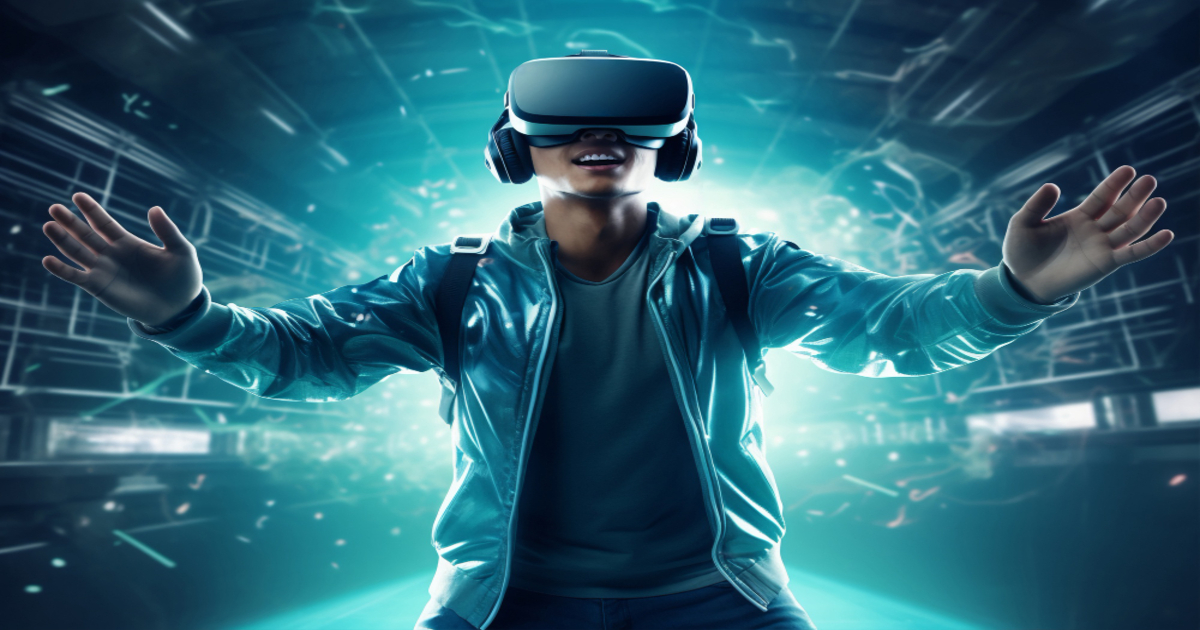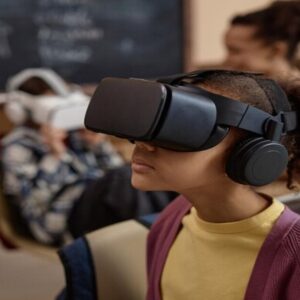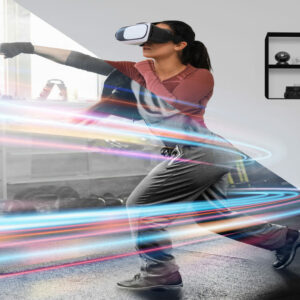Virtual Reality
Have you ever imagined what it would be like to live in a world where virtual reality (VR) is as common as smartphones? Where you could dive into immersive experiences of entertainment, education, work, health, and more without leaving your home? Where you could interact with people from any corner of the planet as if they were right beside you?
Well, know that this world is no longer a science fiction fantasy. Virtual reality is becoming increasingly accessible, advanced, and popular, thanks to technological developments and growing consumer demand. According to a report from Grand View Research, the global VR market is expected to reach $62.1 billion by 2027, with an annual growth rate of 21.6%.
But what exactly is virtual reality and how does it work? What are the benefits and challenges of this technology? And how is it impacting various sectors of society? In this article, we will answer these and other questions about this silent revolution that is shaping our world.
What is virtual reality, and how does it work?
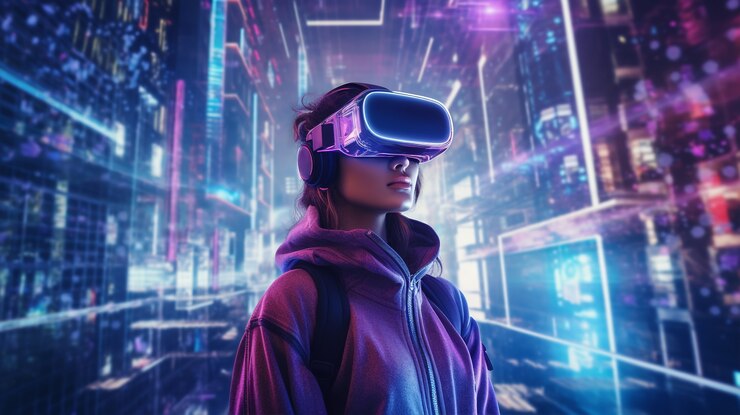
Virtual reality is a technology that creates computer-simulated environments in which the user can feel present. Devices such as goggles, helmets, or special gloves are used to capture the user’s head and hand movements and translate them into the virtual environment.
Thus, the user can see, hear, and even touch virtual objects, as well as interact with other users or characters. The sensation is that of being in another place, without being aware of the real world around. This effect is called immersion or presence.
Virtual reality can be divided into two main types: active VR and passive VR. Active VR allows the user to control the virtual environment and modify or create elements within it. For example, in a VR game, the user can choose their character, setting, and actions. On the other hand, passive VR is when the user simply observes or experiences the virtual environment without being able to alter it. For example, in a VR movie, the user can see the story from a character’s perspective but cannot interfere with it.
What are the benefits of virtual reality?
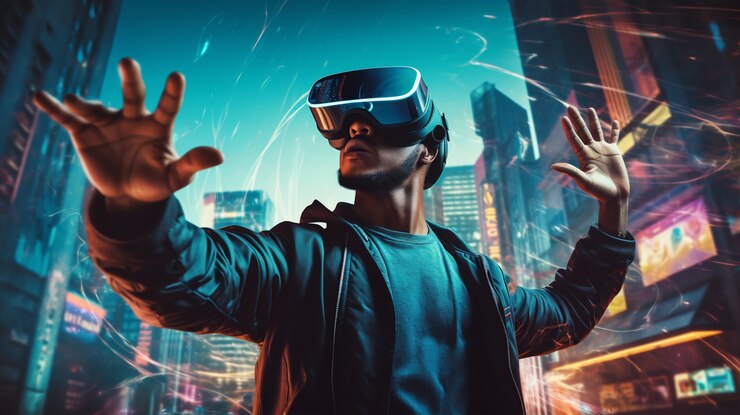
Virtual reality offers a range of benefits across different societal areas. Here are some of them:
- Entertainment: VR provides an innovative and enjoyable form of entertainment, allowing users to experience stories, games, shows, and events as if they were there. Moreover, VR enables the creation of personalized and interactive content that adapts to the user’s preferences and emotions.
- Education: VR facilitates learning by allowing users to explore content in a playful and practical manner. For instance, a student can learn about history by visiting a virtual museum, study biology by dissecting a virtual animal, or engage in physics experiments in a virtual setting. Additionally, VR stimulates creativity, collaboration, and student motivation.
- Work: VR enhances productivity, efficiency, and safety in the workplace by enabling users to perform tasks remotely or in simulated environments. For example, a doctor can perform surgery from a distance using a VR-controlled robot, an engineer can design a construction project in VR before implementation, or a firefighter can train in emergency situations in VR. Furthermore, VR facilitates communication and teamwork among professionals in different locations.
- Health: VR improves the physical and mental health of users by being used in disease treatment, prevention, or well-being promotion. For example, VR can assist patients with phobias, anxiety, or depression in facing their fears or improving their mood through exposure or relaxation techniques in VR. VR can also aid patients with chronic pain, injuries, or disabilities in alleviating suffering or recovering functions through VR exercises or prosthetics. VR can contribute to disease prevention by encouraging healthy habits such as nutrition, exercise, or meditation in VR.
- Social: VR expands the user’s social interaction possibilities by allowing them to connect with people from around the world with different cultures, languages, and interests. For example, users can make friends, date, play, or chat with others in VR using avatars that represent their personalities or appearances. VR can also promote empathy, tolerance, and diversity by allowing users to experience the perspectives of others in VR, such as minorities, refugees, or victims of violence.
What are the challenges of virtual reality?
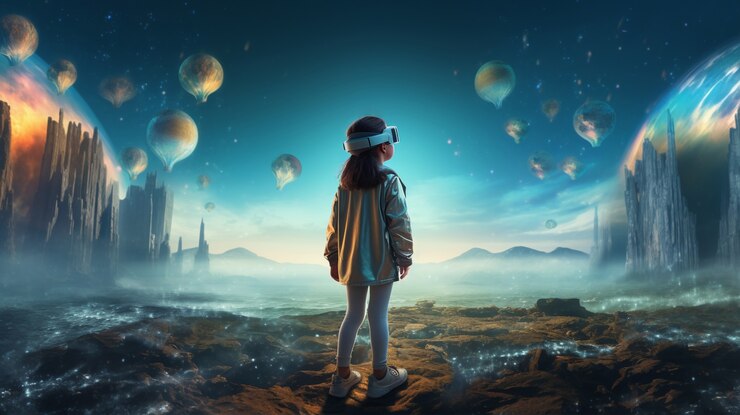
Virtual reality also presents some challenges for its adoption and development. Here are some of them:
- Cost: VR is still an expensive technology that requires high-quality devices and software. Additionally, VR demands a fast and stable internet connection, which is not always available everywhere. These factors limit access and dissemination of VR among the general public.
- Quality: VR is an evolving technology that needs to improve its quality and realism to provide a more satisfying and immersive experience for users. Aspects such as resolution, field of view, audio, tracking, latency, and VR interaction need enhancement.
- Side effects: VR can cause unwanted side effects in users, such as nausea, dizziness, headaches, eye fatigue, or disorientation. These symptoms are caused by the discrepancy between what the user sees in VR and what their body feels in the real world, known as virtual motion sickness. To avoid or reduce these effects, it is recommended to use VR in moderation and in appropriate environments.
- Ethics: VR can raise ethical issues related to the use and impact of technology on society. For example, VR can be used for illicit purposes such as piracy, violence, pornography, or manipulation.
VR can also affect the identity, privacy, and security of the user by exposing personal data, habits, or preferences. VR can influence user behavior, values, and relationships by altering their perception of reality, themselves, and others.
Did you like this topic? See more content about: Virtual Reality
Source: axon park

